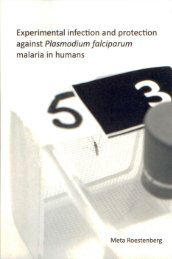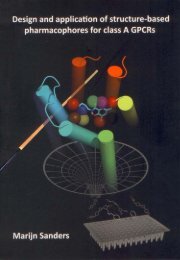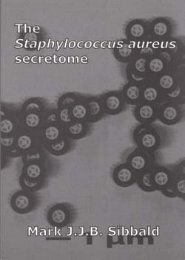Chromosome segregation errors: a double-edged sword - TI Pharma
Chromosome segregation errors: a double-edged sword - TI Pharma
Chromosome segregation errors: a double-edged sword - TI Pharma
Create successful ePaper yourself
Turn your PDF publications into a flip-book with our unique Google optimized e-Paper software.
Introduction<br />
Equal <strong>segregation</strong> of the genetic material to both daughter cells upon cell division depends<br />
on the proper functioning of the mitotic checkpoint 441 . The mitotic checkpoint delays mitosis<br />
until all chromosomes are attached to the mitotic spindle. Defects in this checkpoint signaling<br />
result in chromosome <strong>segregation</strong> <strong>errors</strong>, which can cause aneuploidy and DNA damage<br />
389,390,532 , two hallmarks of cancer 237 . Mps1, a key player in the mitotic checkpoint, is a kinase<br />
originally found to be important in budding yeast spindle pole body duplication 137 , spindle<br />
formation 571 and the mitotic or ‘spindle assembly’ checkpoint 140 . In contrast to Mps1 function in<br />
centrosome duplication and subsequently bipolar spindle formation 143,146-148 , its role in mitotic<br />
checkpoint signaling has been confirmed in higher eukaryotes already for over a decade 124,142,143 .<br />
Introduction of various mutations in the Mps1 kinase domain of mammalian cells has revealed<br />
the essential function of the kinase activity of Mps1 in proper mitotic checkpoint functioning 116-119 .<br />
Moreover, in human cells, Mps1 kinase activity is required for proper alignment of the chromosomes<br />
at the spindle equator by promoting correction of erroneous kinetochore-microtubule<br />
attachments through regulation of Aurora B activity 116,118,123 , another important mitotic kinase 572 .<br />
Because of its essential roles in the mitotic checkpoint and chromosome alignment, complete<br />
absence of Mps1 activity results in cell death within several rounds of cell division 116,118,123,299,573 .<br />
Moreover, partial shRNA-based depletion of Mps1 protein levels results in enhanced sensitivity to<br />
low doses of the microtubule targeting chemotherapeutic paclitaxel (taxol) in human tumor cells 299 ,<br />
whereas immortalized human fibroblasts display less sensitivity to this combination treatment.<br />
Interestingly, Mps1 levels have been found to be strongly elevated in breast cancer cells that<br />
harbor an abnormal chromosome count 322 . Reducing Mps1 levels by RNAi specifically killed these<br />
cancer cells, but did not affect cell viability of isogenic untransformed breast epithelial cells 324 .<br />
These observations have led to a search for more specific Mps1 kinase inhibitors that could be useful<br />
in the treatment of cancer. Various small molecule inhibitors have been developed that target Mps1<br />
kinase activity (reviewed in 167,574 ). However, some of these inhibitors, such as SP600125, Reversine,<br />
staurosporine, Mps1 IN-2 and compound B13, have been shown to have additional targets besides<br />
Mps1, which make them less suitable in target validation studies on the role of Mps1 in cancer<br />
123,550,563,575-577 . Other inhibitors, such as Mps1 IN-1, potently inhibit Mps1, but only do so at relatively<br />
high doses 123 . Two Mps1 inhibitors, NMS-P715 and MPI-0479605, have been shown to exhibit<br />
anti-tumor activity using xenograft studies in mice, but only limited inhibition of tumor growth<br />
has been observed 176,578 . These limitations demonstrate the need for more potent and specific<br />
Mps1 small molecule inhibitors to assess the utility of Mps1 as a target in anti-cancer treatment.<br />
Here, we characterize a previously unrecognized specific small molecule inhibitor of Mps1,<br />
compound-5 579 , which potently binds to the ATP binding pocket of Mps1 with a long residence time<br />
and is active in mice. Using this inhibitor, we can inhibit Mps1 in cells at extremely low doses and<br />
recapitulate the synergistic effects of partial Mps1 depletion and taxol on tumor cell viability 299 .<br />
We find that Mps1 inhibition has a more prominent effect on cell viability of transformed cells,<br />
compared to healthy, untransformed cells, which makes Mps1 inhibition an interesting candidate for<br />
anti-cancer treatment.<br />
117<br />
Mps1 inhibition kills aneuploid cells<br />
6













